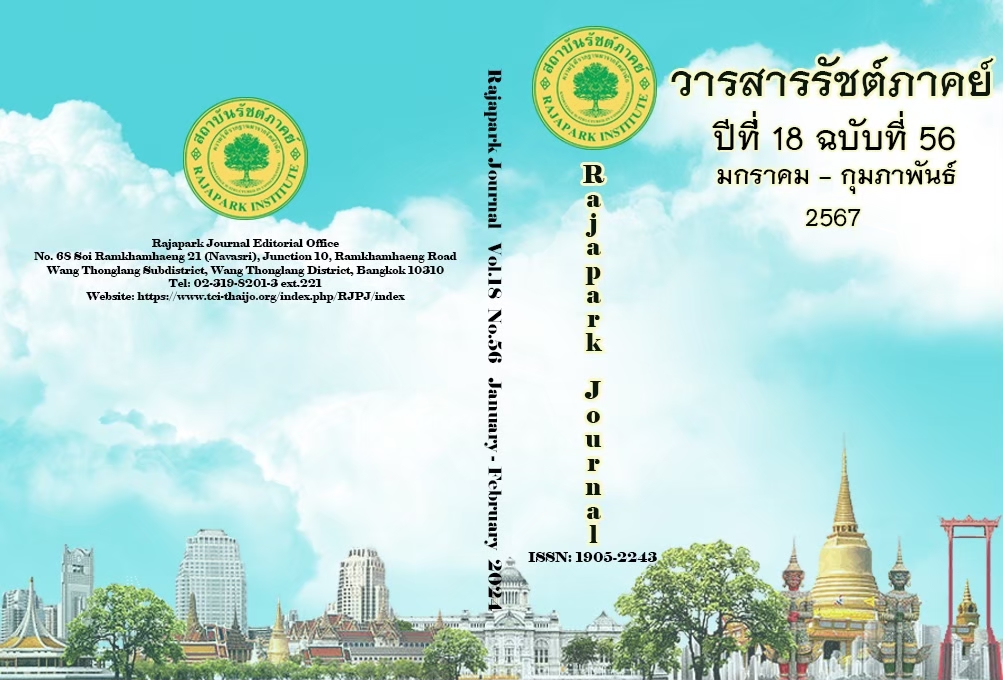Competency Development of Personal Assistant in Northeastern Thailand
Main Article Content
Abstract
This research aimed to 1) study necessary competencies 2) survey current competencies 3) design the competency development method of personal assistants to be consistent with the personal assistant’s necessary competencies. The research design was research and development, with 4 phases. Phrase 1: Part 1 of the research was the study of personal assistants’ necessary competencies; the informants consisted of personal assistants, public officers, people with disabilities; medical professionals, disability organization staff, located in the area of six provinces; the director and officer of the department of empowerment of person with disabilities used the semi-structured interviews for the snowball sampling; and part 2 of the research was the survey of personal assistants’ current competencies. Phrase 2 of the research was the design of the competency development method, consisting of part 1: the focus group discussion; and part 2: the experiment of implementation of the personal assistants’ competency development. Phrase 3 was the competency development evaluation. The final stage, phase 4, was the manual development of the personal assistant’s competency development method. It was found that 1) the necessary competencies included 4 core competencies and 18 competencies identified by disability types; 2) the total average levels of all personal assistants’ current competencies were at the highest levels, 3) the design of the personal assistant’s competency development method to be consistent with the personal assistant’s necessary competencies was the 24 topics manual for regional organizations and organizations networks regarding with people with disabilities to provide the competency development activities for personal assistants and people related in people with disabilities care.
Article Details

This work is licensed under a Creative Commons Attribution-NonCommercial-NoDerivatives 4.0 International License.
Views and opinions appearing in the Journal it is the responsibility of the author of the article, and does not constitute the view and responsibility of the editorial team.
References
Buchanun, L. (2014, Feb). Access to Life: Personal Assistant Services in Ireland and Independent Living by People with Physical and Sensory Disabilities. Disability Federation of Ireland. https://www.disability-federation.ie/assets/files/legacy/DFI001_Access_to_life_report_.pdf
Dechawattanapaisan, D. (2020). Human Resource Management: Fundamental Concept for Practice (2nd ed.). Chulalongkorn University.
Department of Empowerment of Person with Disabilities. (2021, Jan 8). The Person with Disabilities Situation Report in Thailand. https://dep.go.th/th/law-academic/knowledge-base/disabled-person-situation/
Department of Empowerment of Person with Disabilities. (2022, April 26). The Person with Disabilities Situation Report in Thailand. http://dep.go.th/Content/View/5805/1
Department of Empowerment of Person with Disabilities. (2022, May 24). Department of Empowerment of Person with Disabilities provided personal assistant training program 8th. https://dep.go.th/th/news/news-release/
Department of Empowerment of Person with Disabilities. (2023). Operation Plan: Range Five Years (2023 – 2027). https://dep.go.th/index.php?option=com_content&view=article&id=3&Itemid=173&lang=th
Department of Empowerment of Person with Disabilities. (2023). Personal Assistant Manual. Department of Empowerment of Person with Disabilities.
Draganidis, F. & Mentzas, G. (2006). Competency based management: A review of systems and approaches. Information Management & Computer Security, 14(1), 51-64. https://doi.org/10.1108/09685220610648373
Goldman, E., & Scott, A. R. (2016). Competency models for assessing strategic thinking. Journal of Strategy and Management, 9(3), 258-280.
Kongsuwan, W. (2018, July 6). Nursing competency of Maharath Nakornratchsima Hospital. https://www.mnrh.go.th/Nurse/wp-content/uploads/ 2018/07/Handout-Competency-MNRH.pdf
Mladenov, T. (2012). Personal assistance for disabled people and the understanding of human being. Critical Social Policy, 32(2), 242-261. https://doi.org/10.1177/0261018311430454.
National Disability Authority. (2018). A Review of Competency Frameworks for Disability Service Staff. http://nda.ie/Publications/Others/ Research-Publications/Review-of-Competency-Frameworks-Disability-Service-Staff1.pdf
NSW Ministry of Health. (2016, January 27). Intellectual Disability Mental Health Core Competency Framework: A Manual for Mental Health Professionals. https://www.3dn.unsw.edu.au/IDMH-CORE-COMPETENCY-FRAMEWORK
Phuwitthayapan, A. (2009). Competency Development Roadmap. HR Center.
Phuwitthayapan, A. (2010). Competency-based Training Road Map. HR Center.
Phuwitthayapan, A. (2016). Competency-based 70:20:10 Learning Model. HR Center.
Phuwitthayapan, A. (2019). Competency-based Training Needs Analysis (2nd ed.). HR Center.
Pinaisup, B. (2020). Human Resource Development in the Digital Era (2nd ed.). Documents and Textbooks Project, Graduate School of Public Administration, National Institute of Development Administration.
Pitipunyakul, P. (2022, May 20). The Service Situation for People with Disabilities and Disabled Child. In The Welfare and Service for Disabled Child Forum: Situation, Challenge, and Policy [Symposium]. The Welfare and Service for Disabled Child Forum: Situation, Challenge, and Policy, Sathorn, Bangkok, Thailand.
Rassameethammachoti, S. (2007). Human Resource Management with Competency-Based HRM. Thailand Productivity Institute.
Rodthong, N. (2021). The Developing System Guidelines of Providing Personal Assistant for Personal with Disabilities Care. Journal of Social Synergy, 12(2), 1-15. https://so04.tci-thaijo.org/index.php/thaijss/article/download/253308/172472
Shermon, G. (2005). Competency-based HRM. Tata McGraw-Hill.
Slocum, J. W. Jr., Jackson, S.E., & Hellriegel, D. (2008). Competency-Based Management. Thomson Higher Education.
Srisathitnarakoon, B. (2010). The methodology in nursing research (5th ed.). U and I Intermedia.
Srisathitnarakoon, B. (2012). Development and validation of research instruments: psychometric properties. Chulalongkorn University.
The Office of Empowerment of Potential and Right, The Office of Empowerment of Person with Disabilities. (2014, February 21). The Study Project of Providing Personal Assistant Performance Standard, (Research Report). https://dep.go.th/th/law-academic/knowledge-base/articles-research/
Trakoonsantirat, W., & Ratchathawan, K. (2023). The Problems and Obstacles of Competency Development of Personal Assistant. Journal of MCU Nakhondhat, 10(9), 29–43. https://so03.tci-thaijo.org/index.php/JMND/article/view/271643
Werner J.M., & DeSimone R.L. (2009). Human resource development (5th ed.). South-Western. Cengage Learning.
Wongthongdee, S. (2014). Human Resource Development (2nd ed.). Chulalongkorn University.
Wongwanich, S. (2015). Need Assessment Research (3rd ed.). Chulalongkorn University.
Wutthirong, P. (2014). Innovation ManagementL Resource Learning Organization and Innovation. Chulalongkorn University.
Yamnil, S. (2021). Sustainable Human Resource Development (2nd ed.). DPU Cool Print.
Yuthaopath, N., & Boonyaratthanasunthorn, J. (2018). The Personal Assistant Service for Person with Disabilities and their Quality of Life: A Case Study of Nakhonsawan Province. Journal of Social Synergy, 9(2), 63–80. https://so04.tci-thaijo.org/index.php/thaijss/article/view/177854


